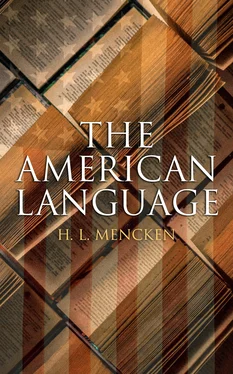§ 3
New Words of English Material
Table of Contents
—But of far more importance than these borrowings was the great stock of new words that the colonists coined in English metal—words primarily demanded by the "new circumstances under which they were placed," but also indicative, in more than one case, of a delight in the business for its own sake. The American, even in the early eighteenth century, already showed many of the characteristics that were to set him off from the Englishman later on—his bold and somewhat grotesque imagination, his contempt for authority, his lack of aesthetic sensitiveness, his extravagant humor. Among the first colonists there were many men of education, culture and gentle birth, but they were soon swamped by hordes of the ignorant and illiterate, and the latter, cut off from the corrective influence of books, soon laid their hands upon the language. It is impossible to imagine the austere Puritan divines of Massachusetts inventing such verbs as to cowhide and to logroll , or such adjectives as no-account and stumped , or such adverbs as no-how and lickety-split , or such substantives as bull-frog , hog-wallow and hoe-cake ; but under their eyes there arose a contumacious proletariat which was quite capable of the business, and very eager for it. In Boston, so early as 1628, there was a definite class of blackguard roisterers, chiefly made up of sailors and artisans; in Virginia, nearly a decade earlier, John Pory, secretary to Governor Yeardley, lamented that "in these five moneths of my continuance here there have come at one time or another eleven sails of ships into this river, but fraighted more with ignorance than with any other marchansize." In particular, the generation born in the New World was uncouth and iconoclastic; 16the only world it knew was a rough world, and the virtues that environment engendered were not those of niceness, but those of enterprise and resourcefulness.
Upon men of this sort fell the task of bringing the wilderness to the ax and the plow, and with it went the task of inventing a vocabulary for the special needs of the great adventure. Out of their loutish ingenuity came a great number of picturesque names for natural objects, chiefly boldly descriptive compounds: bull-frog , canvas-back , lightning-bug , mud-hen , cat-bird , razor-back , garter-snake , ground-hog and so on. And out of an inventiveness somewhat more urbane came such coinages as live-oak , potato-bug , turkey-gobbler , poke-weed , copper-head , eel-grass , reed-bird , egg-plant , blue-grass , pea-nut , pitch-pine , cling-stone (peach), moccasin-snake , June-bug and butter-nut . Live-oak appears in a document of 1610; bull-frog was familiar to Beverley in 1705; so was James-Town weed (later reduced to Jimson weed , as the English hurtleberry or whortleberry was reduced to huckleberry ). These early Americans were not botanists. They were often ignorant of the names of the plants they encountered, even when those plants already had English names, and so they exercised their fancy upon new ones. So arose Johnny-jump-up for the Viola tricolor , and basswood for the common European linden or lime-tree ( Tilia ), and locust for the Robinia pseudacacia and its allies. The Jimson weed itself was anything but a novelty, but the pioneers apparently did not recognize it, and so we find them ascribing all sorts of absurd medicinal powers to it, and even Beverley solemnly reporting that "some Soldiers, eating it in a Salad, turn'd natural Fools upon it for several Days." The grosser features of the landscape got a lavish renaming, partly to distinguish new forms and partly out of an obvious desire to attain a more literal descriptiveness. I have mentioned key and hook , the one borrowed from the Spanish and the other from the Dutch. With them came run , branch , fork , bluff , (noun), neck , barrens , bottoms , underbrush , bottom-land , clearing , notch , divide , knob , riffle , gap , rolling-country and rapids , 17and the extension of pond from artificial pools to small natural lakes, and of creek from small arms of the sea to shallow feeders of rivers. Such common English geographical terms as downs , weald , wold , fen , bog , fell , chase , combe , dell , heath and moor disappeared from the colonial tongue, save as fossilized in a few proper names. So did bracken .
With the new landscape came an entirely new mode of life—new foods, new forms of habitation, new methods of agriculture, new kinds of hunting. A great swarm of neologisms thus arose, and, as in the previous case, they were chiefly compounds. Back-country , back-woods , back-woodsman , back-settlers , back-settlements : all these were in common use early in the eighteenth century. Back-log was used by Increase Mather in 1684. Log-house appears in the Maryland Archives for 1669. 18 Hoe-cake , Johnny-cake , pan-fish , corn-dodger , roasting-ear , corn-crib , corn-cob and pop-corn were all familiar before the Revolution. So were pine-knot , snow-plow , cold-snap , land-slide , salt-lick , prickly-heat , shell-road and cane-brake . Shingle was a novelty in 1705, but one S. Symonds wrote to John Winthrop, of Ipswich, about a clapboarded house in 1637. Frame-house seems to have come in with shingle . Trail , half-breed , Indian-summer and Indian-file were obviously suggested by the Red Men. State-house was borrowed, perhaps, from the Dutch. Selectman is first heard of in 1685, displacing the English alderman . Mush had displaced porridge by 1671. Soon afterward hay-stack took the place of the English hay-cock , and such common English terms as byre , mews , weir , and wain began to disappear. Hired-man is to be found in the Plymouth town records of 1737, and hired-girl followed soon after. So early as 1758, as we find by the diary of Nathaniel Ames, the second-year students at Harvard were already called sophomores , though for a while the spelling was often made sophimores . Camp-meeting was later; it did not appear until 1799. But land-office was familiar before 1700, and side-walk , spelling-bee , bee-line , moss-back , crazy-quilt , mud-scow , stamping-ground and a hundred and one other such compounds were in daily use before the Revolution. After that great upheaval the new money of the confederation brought in a number of new words. In 1782 Gouverneur Morris proposed to the Continental Congress that the coins of the republic be called, in ascending order, unit , penny-bill , dollar and crown . Later Morris invented the word cent , substituting it for the English penny . 19In 1785 Jefferson proposed mill , cent , dime , dollar and eagle , and this nomenclature was adopted.
Читать дальше












